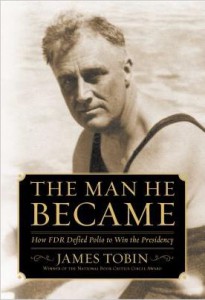Does becoming disabled make you strong?
by Beth
 Sometimes people I meet for the first time feel the need to point out there are benefits to becoming disabled. They tell me hardship can make you strong. Compassionate. Thoughtful.
Sometimes people I meet for the first time feel the need to point out there are benefits to becoming disabled. They tell me hardship can make you strong. Compassionate. Thoughtful.
I lost my sight in my 20s, and I know firsthand that becoming blind changes the way a person moves through space, how they read, and the ways they perform other daily living skills. Isn’t that enough? Does it have to change one’s character, too?
A Fresh Air interview with journalist James Tobin I happen to catch on NPR last month reassured me that I am not alone in trying to make sense of this change-of-character concept. Tobin was being interviewed about his new book The Man He Became: How FDR Defied Polio to Win the Presidency, and the interviewer, Dave Davies, said contracting polio as a man and losing the use of one’s legs must have been a shattering experience. Then he asked Tobin, “Do you think it made him a different president?”
Tobin said that after contracting polio, President Roosevelt was still the man he had been before. People close to Roosevelt said it tempered him, and his wife Eleanor herself said it made him stronger and more courageous, but the author said, “That doesn’t quite make sense to me. I think people have those innate capacities or they don’t. The crisis draws it out of them. It allows them to see who they really are.”
The way James Tobin talked about disability in this interview is helping me put some of my own thoughts about becoming blind into words. Maybe becoming disabled can give a person a kind of confidence in the strengths that were already there, and a person just can’t get that kind of confidence until they’re tested. If that’s true, it’s one upside to becoming disabled that I actually can embrace.






